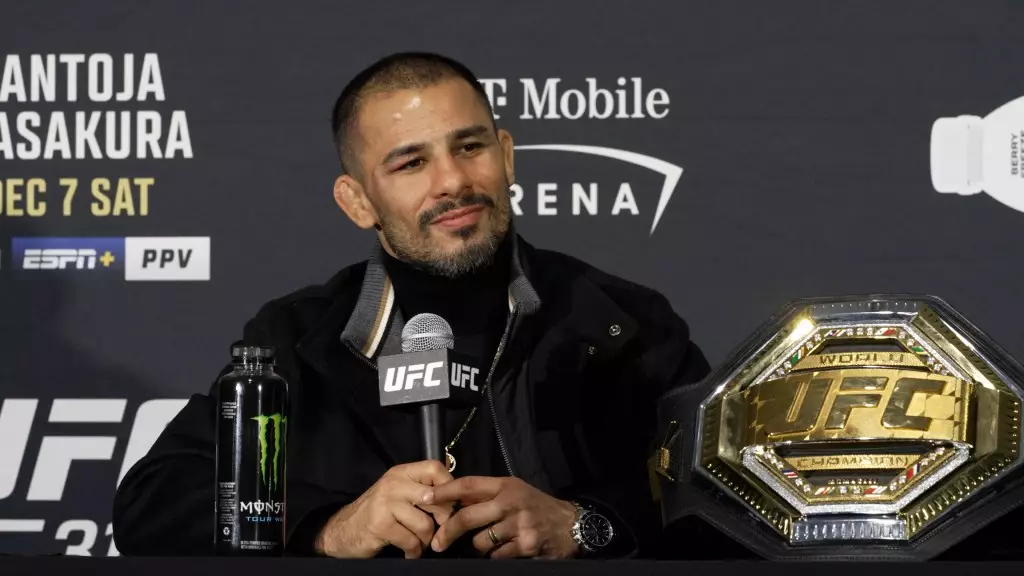In the world of mixed martial arts, few moments resonate as profoundly as those that take place inside the octagon. At UFC 310, Alexandre Pantoja solidified his position in the flyweight hierarchy with a spectacular victory over Kai Asakura, earning the attention not only of the audience but also of the legendary Demetrious Johnson. Pantoja’s post-fight remarks were an invitation to reconsider the landscape of the division and the legacies that define it. His words were not just about a callout; they signified a pivotal moment that spoke volumes about ambition and legacy in a sport that constantly evolves.
Pantoja’s journey in the UFC has been marked by resilience and determination. With a professional record of 29 wins and 5 losses, including 13 UFC victories, he has shown that he is not merely a competitor but a formidable force in the flyweight division. His assertive declaration that he has “cleaned the division” after securing victories against top contenders shows his confidence and understanding of the competitive nature of MMA. Each opponent he faced has contributed to a narrative of growth, preparation, and adaptation — essential traits for any fighter seeking to leave a mark.
In post-fight interviews, Pantoja drew a clear line between the motivations that drive fighters. Unlike many who chase financial gain, Pantoja emphasizes the importance of legacy. His reference to wanting a fight with Demetrious Johnson wasn’t rooted in monetary incentives but rather a desire to prove himself against one of the best in the sport’s history. “I’m here to figure out who’s the best of the best,” he declared, reflecting a mindset that values skill, achievement, and respect over mere financial compensation.
This idea invites a broader discourse. In an era where quick financial rewards are often prioritized, Pantoja’s vision of fighting for legacy resonates deeply, especially in light of Johnson’s recent retirement. For Pantoja, every fight encapsulates a chapter in the story he is crafting — a tale defined by tenacity and skill, rather than the dollars earned. It challenges not only current fighters but also those aspiring to enter the sport to contemplate their motivations within the octagon.
Pantoja’s consideration of the changes in the flyweight division underscores the transformation that has taken place in MMA. He acknowledges that competition has intensified with fighters from varied backgrounds representing different regions—Mexican, Australian, American, and Japanese athletes are now part of a diverse tapestry that enriches the sport. The contemporary flyweight division presents unique challenges that require fighters to be well-rounded, adaptable, and strategic.
This evolving landscape highlights the importance of understanding not only one’s opponents but also the shifting dynamics within the sport. Fighters today must be prepared to face not just the straightforward brawlers but also those who bring technical skill and a strategic mindset to the cage. Pantoja’s adaptability and success against a wide array of fighting styles inaugurate a new chapter where the concept of a ‘champion’ is colors ever more complex by international representation and diverse fighting schools.
Looking ahead, the question remains: what is next for Alexandre Pantoja? His eagerness to engage with Demetrious Johnson offers an intriguing storyline, yet it also opens discussions about how legacy fights influence the trajectory of a fighter’s career. Although Johnson has indicated that he is not interested in returning to the octagon, Pantoja’s challenge signifies a yearning to test his abilities against the finest.
Ultimately, Pantoja stands at a crossroads—a champion who’s focused on fortifying his legacy while recognizing the reality of an evolving competitive environment. Each fight, each callout, is another step towards establishing his place in the annals of UFC history. Whether or not he gets the fight with Johnson, the fire in his eyes and determination in his heart suggest that the pursuit of greatness is far from over. As the flyweight division continues to grow and diversify, Pantoja’s narrative strengthens, promising to inspire both current competitors and future stars in the realm of mixed martial arts.

